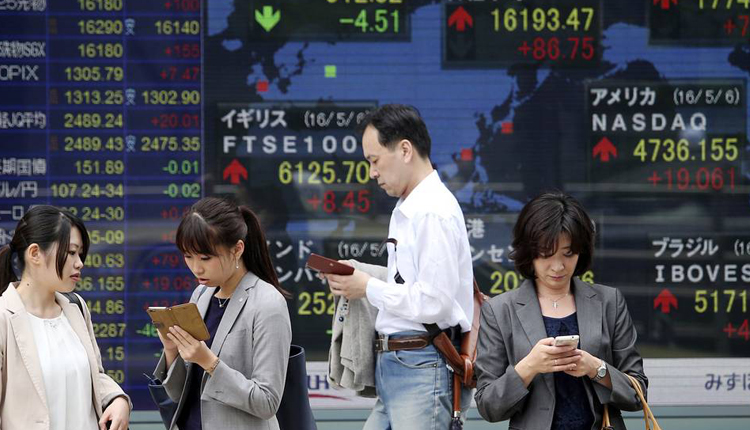Asian stocks recovered from earlier lows to trade higher Thursday afternoon as investors watched for developments on the U.S.-China trade front ahead of high-level negotiations between the two economic powerhouses.
Mainland Chinese stocks edged up by the afternoon, with the Shanghai composite up 0.19 percent and the Shenzhen component gaining 0.45 percent. The Shenzhen composite also advanced 0.507 percent.
The New York Times reported Wednesday evening stateside that U.S. President Donald Trump’s administration is set to grant licenses that would allow American firms to sell nonsensitive supplies to Huawei.
Earlier this year, the White House banned sales to the Chinese telecommunications giant, citing national security concerns. The ban was subsequently delayed by the administration to allow American firms to make other arrangements.
Meanwhile, Hong Kong’s Hang Seng index was 0.18 percent higher.
Elsewhere, the Nikkei 225 in Japan rose 0.21 percent. The Topix index, however, traded 0.29 percent. Core machinery orders in the country fell for the second consecutive month in August, according to Cabinet Office data on Thursday.
In South Korea, the Kospi shed 0.97 percent. Australia’s S&P/ASX 200 slipped 0.22 percent.
Overall, the MSCI Asia ex-Japan index traded largely flat.
Markets in Taiwan are closed on Thursday for a holiday.
US-China trade talks
Investors are monitoring chatter on U.S.-China trade talks, which are set to begin Thursday stateside amid a series of rapid developments. A South China Morning Post report on Thursday morning in Asia said the two sides made no progress in deputy-level negotiations this week.
In discussions that were held earlier in the week, China refused to discuss the issue of forced technology transfers, the report said.
The SCMP report also said that high-level trade negotiations including Chinese Vice Premier Liu He would be cut to one day now, with the delegation from Beijing set to leave Washington on Thursday instead of Friday as originally planned.
For its part, a White House spokesperson told CNBC’s Kayla Tausche: “We are not aware of a change in the Vice Premier’s travels plans at this time.”
A senior administration official also told CNBC that Liu is still scheduled to depart on Friday evening.
The trade negotiations between Washington and Beijing this week were highly anticipated. The two largest economies have struggled to reach a deal to end their trade war that has now lasted for more than a year. Washington and Beijing have slapped tariffs on billions of dollars worth of each other’s goods.
“As of right now, [President Trump] has not made up his mind because he does not know what they’re going to offer,” a senior official told CNBC.
A principal in the negotiations later told CNBC, however, that Friday’s session is now an “open question.”
Bloomberg News also reported overnight that the U.S was considering an agreement to suspend next week’s tariff increase in exchange for a currency pact.
The U.S. previously announced it will increase duties on $250 billion worth of Chinese goods from 25 percent to 30 percent on October 15. A 15 percent tariff on an additional $160 billion worth of Chinese imports is also expected to kick in on December 15.
“The prize for some sort of trade deal today – no matter how trivial – will be to avoid the implementation of further tariffs,” Robert Carnell, chief economist and head of research for Asia Pacific at ING, wrote in a note.
“I think that a ‘nothing achieved’ outcome from today’s talks would return markets to a risk-off mode fairly quickly,” Carnell said.
U.S. stock futures saw wild trading following the SCMP report, with Dow Jones Industrial Average futures plunging more than 300 points at one point. They later saw a partial recovery as more developments emerged.
As of 12:11 a.m. ET Thursday, futures pointed to an opening decline of 55.01 points for the Dow. S&P 500 and Nasdaq-100 futures also pointed to slight declines for the two indexes at Thursday’s open on Wall Street.
Currencies and oil
The U.S. dollar index, which tracks the greenback against a basket of its peers, was last at 98.992 after seeing an earlier high of 99.067.
The Japanese yen, often seen as a safe-haven currency in times of market turmoil, traded at 107.56 per dollar after touching an earlier high of 107.02. The Australian dollar changed hands at $0.6748 following a low of $0.6707 seen earlier.
Oil prices declined in the afternoon of Asian trading hours, with international benchmark Brent crude futures slipping 0.19 percent to $58.21 per barrel. U.S. crude futures also declined 0.21 percent to $52.48 per barrel.
Source: Reuters


